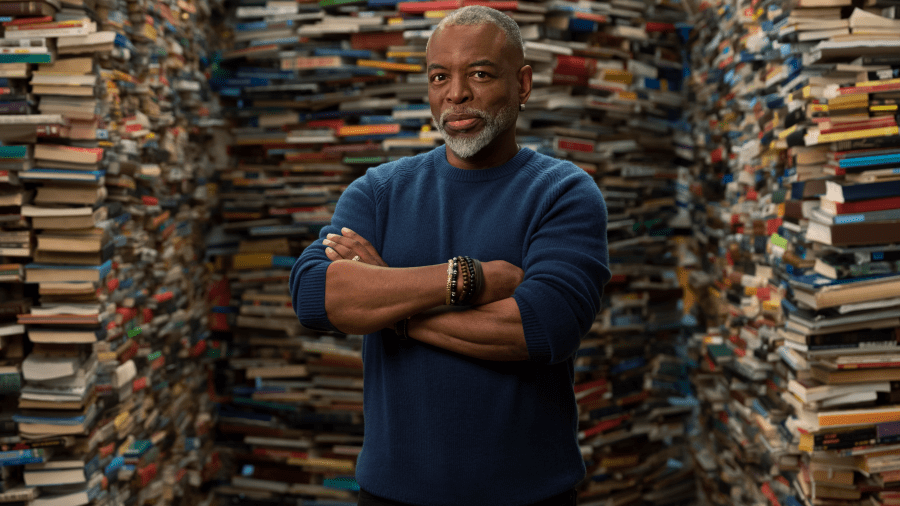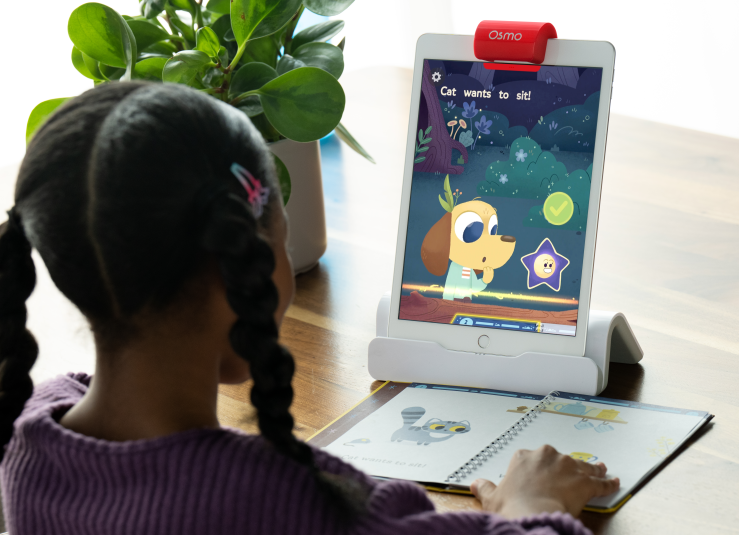The new tech behind LeVar Burton’s crusade for child literacy (re-air)

Actor and producer LeVar Burton is famous for many things. His iconic roles on “Star Trek” and the miniseries “Roots,” for instance. But many of us got to know him as host of the PBS show “Reading Rainbow.” His run with the show ended in the mid-2000s, but Burton is still promoting literacy for kids.
He’s now the “chief reading officer” at ed-tech company Byju’s Osmo. Together, they’re launching a reading program for kids ages 5 to 7 that uses an iPad and the Osmo app’s artificial intelligence and speech recognition to help kids grasp the fundamentals of reading. That program is set to launch next month.
Marketplace’s Kimberly Adams spoke with Burton earlier this year about the unique reading challenges facing kids today. The following is an edited transcript of their conversation.
LeVar Burton: The amount of distractions that are available, that can pull a child off the journey towards literacy, are legion. So it’s a very active, oftentimes confusing, sort of cacophonous world that children are having to focus and learn these rudiments of reading in. And anything we can do to help them focus, take advantage of their natural skills, inclinations and curiosities in the service of learning to read, I’m in.
Kimberly Adams: Does it matter, though, where and how a child reads? I was talking to a schoolteacher on a plane, and she said she had some concerns about children only reading on these small screens as opposed to on a broader space. Does it really make a difference if a kid is reading on a tablet versus on a phone versus a physical book?
Burton: That’s a really complex question, Kimberly, because there is the issue of how much screen time is appropriate for a child. Having said that, I simply want kids to read, OK? And parents ask me all the time, how do I get my child to read more? And I ask them, generally, two questions. One, do your children see you reading? Because it is that all-important example, that modeling, that really informs a child just how important the activity of reading is to you, as their parent. Second question I ask them is what is your child passionate about? Because it’s our passions that really drive our reading appetite. So if your kid loves superheroes, then, damn it, buy your kid comic books. And if their only access to literature is via a device, then that’s what we use.
Adams: I was obsessed with books as a kid. I mean, I’d go through dozens in a summer. But I had my 12-year-old niece and my 10-year-old nephew down for visits this summer, and I’m like throwing books at them trying to find their interests, and they’re just not so much into reading. They’d rather watch [Instagram] Reels or social media clips.
Burton: Yeah.
Adams: And I just wonder how you can get kids to get into longer stories. And I just want them to love the written word like I do.
Burton: If you need to use the engagement factor of technology, which I recognize in this world, we do. Because it’s something that they’re familiar with. Again, in the ’80s, America’s kids were sitting in front of the television set, that’s why we went to TV. But today’s kids, they are digital natives, Kimberly, and we have to use that to our advantage. That has to be our entry point because the purpose has always been meet them where they are.

Adams: We know that there are big gaps in reading achievement by race and by income. And we also know that technology, like a tablet, can be expensive. So how do we make sure that these tools like Osmo are accessible to the kids who need them the most?
Burton: The digital divide is real. I know that, Osmo knows that and we are doing whatever we can to make the device part of the equation available and ubiquitous. It’s where the technology is going. And for those who don’t possess the tablet, at the beginning of the journey, there is, there’s a free app that you can access the service online.
Adams: As you talk to parents and caretakers and you’re encouraging them to try out new technologies to get kids to be more engaged with reading, what about parents who are squeamish about things like artificial intelligence and surveillance and privacy of their kids when they’re spending so much time on these devices, and so many apps and things can get hacked and that information can go anywhere?
Burton: Acknowledged. There are pitfalls, there are dangers. However, I want to be really clear, I am using this technology with a trusted partner. I stand on my reputation. And I stand on the decades that I’ve been about this work. And I wouldn’t, I wouldn’t be here if I didn’t think that this was a viable solution for kids and for parents.
Adams: I’m sure that you hear this all the time. But I did grow up watching “Reading Rainbow,” and when I told my sister this morning that I was going to talk to you, she literally burst out in the song, the whole thing, beginning to end.
Burton: I love it, I love it.
Adams: But, she was thinking out loud about someone like you who spent so many decades around children’s literacy, and especially being a Black man in this space, how you feel about what you see is the impact, and are you seeing it the way that you want to?
Burton: Well, every day of my life, I encounter someone like you and your sister who grew up on the show and report to me that it had a powerful, positive impact on their life. A couple of generations ago, it would have been illegal for me to have the gift of literacy, right? Punishable by whipping, certainly. Death, perhaps. To have grown up the son of an English teacher, a Black man, to become a symbol for literacy in this country. I can’t even begin to share with you the depth of pride that brings me and my family.
Related links: More insight from Kimberly Adams
Children’s literacy isn’t just about reading skills, it’s also about access to books, which has become an increasingly political issue.
The American Library Association reported 681 book bans or restrictions this year — and that was just through mid-September. Last year, there were at least 729 book challenges, the highest number since the group started tracking it in 2000.
NBC News has a piece about the impact on e-reader app companies like Overdrive and Epic and school districts cutting off these services because they provide kids with access to things like books that deal with LGBTQ+ issues.
But there are still e-book services available to students across the country.
The Brooklyn Public Library has the Books Unbanned project, in which students ages 13 to 21 from anywhere in the country can sign up for a national BPL card and borrow e-book of banned works. Like Maia Kobabe’s “Gender Queer” or Toni Morrison’s “The Bluest Eye.”
LeVar Burton reacted to those bans in an interview on the TV show “The View.” His take was first a word I can’t include here, but also that the bans were “embarrassing” for our country.
The future of this podcast starts with you.
Every day, the “Marketplace Tech” team demystifies the digital economy with stories that explore more than just Big Tech. We’re committed to covering topics that matter to you and the world around us, diving deep into how technology intersects with climate change, inequity, and disinformation.
As part of a nonprofit newsroom, we’re counting on listeners like you to keep this public service paywall-free and available to all.
Support “Marketplace Tech” in any amount today and become a partner in our mission.












